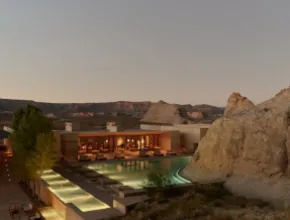It’s an enticing proposition for meeting planners and attendees alike: a luxury meeting at a posh hotel known for the highest levels of luxury and service. There’s the elegant atmosphere, the sumptuous guest rooms, fine food and attentive service, all helping to ensure a successful luxury meeting and memorable experience.
But is the prospect of using a high-end property simply out of bounds when a planner is working on a limited budget? Can the group afford a luxury meeting at the best property available, or should it set its sights a notch or two lower?
Executives at some of the most luxurious hotels in the western U.S. have a simple answer to that question: Try us. Often, meeting planners are pleasantly surprised that, even with their budget limitations, they can afford to hold a meeting at such top-level properties as a Four Seasons, St. Regis, Ritz-Carlton or Peninsula.
“They should always call to see what we can do for them,” says Sue Manzi, director of conference services for the Beverly Wilshire, A Four Seasons Hotel, in Beverly Hills, Calif. “It never hurts to ask. Four Seasons often does corporate promotions; sometimes offers are available that make costs more reasonable for clients on a tight budget.”
At the Beverly, there is never a “down” season where rates are lower. Instead, there are some days spread over the course of the year where a meeting planner will find some lower cost possibilities, Manzi says. Flexibility also can help planners secure better rates, she notes.
“In regards to timing, we don’t have a down season, and day of the week doesn’t play into it either,” she says. “But there are days near some holidays, such as Easter or Passover, and perhaps the second week of December, versus the first week of December, which have higher demand. Try us and you may find dates that are less busy. Often there also are dates in the summer, when we’re quieter.
“A lot of times meeting planners are working with set dates that can’t be changed, and that is an issue,” she continues. “If someone were to book a meeting at the same time as the Academy Awards, for example, that would be difficult.”
At The Ritz-Carlton, San Francisco, planners who are flexible can often find a spot for a luxury meeting within their budget, says Alexandra Nicandri, director of meetings and special events.
“We work with almost any budget,” she says. “When a client comes in and shows us the budget, we say what we can do. We’re always looking for groups willing to arrive on a Sunday, for example. Or, July and August are low-season for meetings; we have high transient demand but more meeting space available then.”
The Peninsula Beverly Hills is making a push for more luxury meetings and may surprise planners with possibilities, says Susan Choi-Grant, director of group sales.
“Historically, we’ve had more of a transient leisure base, but after the business cycles of the last few years, the hotel decided to attract more group business.”
As with the Beverly Wilshire, the “awards season” in Los Angeles—near the Grammys, the Emmys, the Golden Globes or the Academy Awards—is the most expensive and difficult time to book a meeting.
“A good time is the fall and almost any time of the year [except ‘awards season’] for meetings with Sunday or Monday arrivals,” Choi-Grant recommends.
The Four Seasons, Vancouver, British Columbia, is most likely to host groups on a budget during certain times of year and days of the week, says Todd Jeannotte, director of catering and conference services.
“Look for dates around a long weekend, perhaps in July, August or early January,” he says. “Long weekends in city hotels tend to be less busy and function space is wide open so we can be flexible with food and beverage.”
Working with tight budgets has become routine during the last few years of the economic recession, according to Jeannotte.
“We can ‘value engineer’ events when budgets have to scale down,” he asserts. “We can bring things down to more budget-friendly rates, if need be.”
The area where there is room to play with costs is food and beverage, Jeannotte says.
“Often we will be approached by clients with x amount for food and beverage and we create a menu based on that budget,” he says.
While beef and lamb are most expensive, planners can try some less expensive menu choices, including cuts of meat such as short- ribs or flank steak—or vegetarian dishes using locally grown produce. Attendees may enjoy such dishes as a change of pace for a meal—and appeal to their desires for better health and sustainable eating practices, he notes.
“Breakfast is often an area where there is room to save,” Jeannotte says. “Instead of offering fresh fruit, such as citrus or pineapple, which are imported, we would offer a granola parfait, which is not as expensive. Maybe we decide not to use orange juice but offer apple cider or cranberry juices, which are from our area. There’s benefit because it costs less and it’s local so there is a feel-good side to it.”
However, all luxury hotels have standards that they will not fall below for luxury meetings.
“We can cater to a certain price point while still delivering a Four Seasons experience,” Jeannotte says. “We know what our food cost is for particular items. But meeting planners need to understand that our No. 1 cost is labor and we’re not going to pull away from labor and give less than a Four Seasons experience from the labor perspective. That’s not what we’re about; we won’t go there.”
At the Beverly Wilshire, some planners take dinner off-property to find less expensive options, Manzi says. They may decide to have attendees get breakfast on their own, and then may opt for pitchers of tap water instead of bottled water in the meeting.
“Planners also can save by using the hotel’s in-house AV team instead of flying a company from another part of the country,” Manzi notes. “And, planners can use the decor and linens that are our standard equipment instead of renting, which adds to the price. You can use our candles, which are complimentary, instead of flower arrangements from outside. The aesthetics are still there.”
As with the Four Seasons, Manzi says there are minimum levels of service and food supply that the Beverly Wilshire will refuse to drop below in order to maintain its standards.
“We don’t want to go below a certain level of food, for example,” she says. “We wouldn’t want guests to walk away unhappy with the hotel, and with the meeting planner.”
At The Ritz-Carlton, San Francisco, groups looking to shave costs off a luxury meeting sometimes decide on activities off-site, Nicandri says.
“There’s so much to do in San Francisco that doesn’t cost a lot,” she says. “We suggest providing delegates a $6 cable car pass. People love going out and exploring the city on their own, doing a walking tour or seeing art exhibits. That’s the advantage of having a hotel in the middle of a city—people want to experience San Francisco.”
The Peninsula Beverly Hills encourages planners to look beyond the rate offered because lower-priced competitors can have hidden costs.
“For example, Internet access in guest rooms and meetings rooms are included in our rates,” Choi-Grant notes. “Every guest room has its own scanner, fax and printer. There’s a complimentary welcome beverage and fruit. Don’t just look at the rate, look at everything that goes with it.”
It’s also worth trying the Peninsula when a group includes attendees likely to stay at the hotel on their own, she adds.
“Sometimes, for the right profile guest I am able to go a bit lower on rates,” Choi-Grant says. “If it’s the type of guest who will come back on their own and there’s a likelihood of repeat business [there’s more room to negotiate], but we won’t skimp on anything because providing the experience is most important.”
Adds The Ritz-Carlton’s Nicandri, “Come to us with a budget and give us the opportunity, you will be amazed how creative we can be. Creativity is the name of the game.”
Laura Del Rosso fondly recalls a hard hat tour of the Ritz-Carlton San Francisco in 1991.






